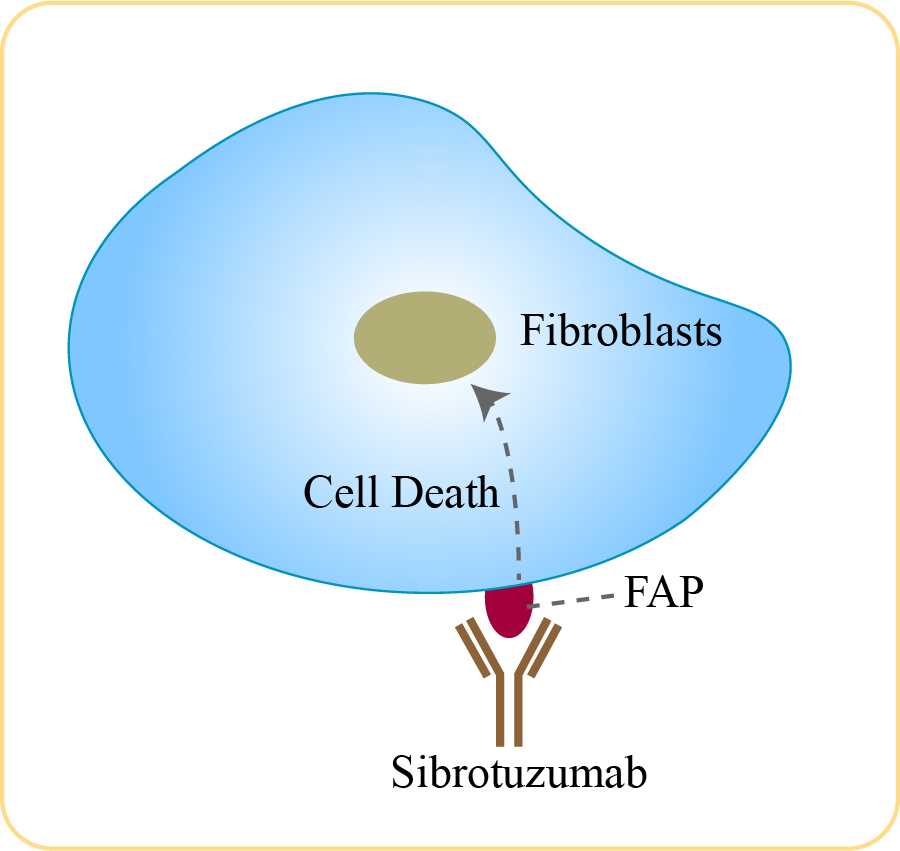Sibrotuzumab Overview
Introduction of Sibrotuzumab
Sibrotuzumab (also known as BIBH 1) is a humanized monoclonal antibody (mAb) which has the high affinity to bind to fibroblast activation protein (FAP), which is highly expressed by stroma cells of tumors. Firstly, this drug was designed to fight against various malignancies, such as colorectal, non-small cell lung, breast, as well as head and neck cancer. However, it is disappointing that in 2003 it failed a phase II clinical trial for metastatic colorectal cancer. At present, there is no relevant clinically approved information disclosure.
Mechanism of Action of Sibrotuzumab
The growth of solid neoplasms, including epithelial cancers, beyond a diameter of about 1-2 mm requires the formation of a supporting tumor stroma to ensure the supply of nutrients for tumor cell survival and growth. In carcinomas, such as breast, colorectal, or lung cancers, the supporting tumor stroma comprises two major cell types: newly formed blood vessels and activated tumor stromal fibroblasts. The tumor stroma compartment represents a major component of the mass in most carcinomas, with 20–50% commonly seen in breast, lung, and colorectal cancers and reaching >90% in carcinomas with desmoplastic reactions. Unlike the malignant epithelial cells of carcinomas, the tumor capillary endothelial cells and activated tumor stromal fibroblasts are not transformed genetically, do not permit overgrowth of clonal variants, and do not show the genetic and phenotypic heterogeneity observed in the malignant cells. However, they differ from resting capillary endothelial cells and resting fibrocytes of normal adult tissues in morphology, molecular structure (as determined with antibody probes), gene expression profile, and production of biologically important mediators and proteases. The concept of targeting antigens expressed selectively on the surface of tumor capillary endothelial cells or in tumor stroma has emerged as a promising new area of cancer therapeutics. Immunohistochemical studies with a range of normal and neoplastic human tissues have shown no F19 immunoreactivity in any normal adult organs tested, except for a subset of endocrine cells in the pancreatic islets, presumably glucagon-producing A cells. Tests with human tumor tissues have identified two distinct patterns of F19 immunoreactivity: a proportion of soft tissue and bone sarcomas, notably malignant fibrous histiocytomas, express the F19 antigen as a classical tumor antigen on transformed cells, and a large proportion of carcinomas of the breast, colorectum, lung, pancreas, stomach, and esophagus, as well as squamous cell carcinomas of the head and neck show strong and consistent F19 immunoreactivity in their tumor stromal fibroblast compartment. Identical patterns of F19 immunoreactivity have been detected in primary and metastatic tumors. FAP is a novel type II membrane-bound glycoprotein belonging to the serine protease gene family, and is known to have dipeptidyl peptidase activity. Whereas expression of murine FAP in transfected cell lines has been shown to enhance tumor growth in vivo, the physiological role of FAP is yet to be determined, and the factors responsible for tumor induction of FAP are unknown. Sibrotuzumab, a humanized version of the mAb F19, can target the fibroblast activation protein (FAP). This drug is able to recognize the cell surface molecule of activated fibroblasts and certain sarcoma cell lines. Therapeutic strategies afforded by targeting of FAP in human tumor by mAbs include mediation of immune effector function effects on stroma, and the delivery of radioisotopes, drugs, or toxins to tumor, which could result in stromal ablation and disruption of nutrient supply to tumor cells, or direct effects on tumor cells causing cell death.

Fig.1 Mechanism of action of Sibrotuzumab
For research use only. Not intended for any clinical use.
This site is protected by reCAPTCHA and the Google Privacy Policy and Terms of Service apply.



